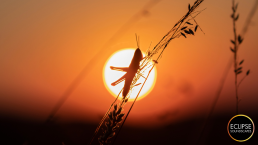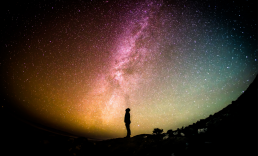Month: January 2021
In a giant leap for STEAM accessibility, the Eclipse Soundscapes Citizen Science Project is selected for NASA SciAct Award
Medford, Mass. — The Eclipse Soundscapes: Citizen Science Project (ES:CSP), an enterprise of ARISA Lab, has been approved for a five year cooperative agreement from the NASA Science Mission Directorate’s SciAct Program and will now be supported by NASA under award No. 80NSSC21M0008. ES:CSP will engage NASA subject matter experts (SMEs) with citizen scientists to explore how U.S. ecosystems are impacted by solar eclipses, such as those upcoming in 2023 and 2024. The project will promote inclusive and accessible learning, with a special focus on people who are blind or low vision (BLV).
“The Eclipse Soundscapes Project launched with the intention of making the 2017 total solar eclipse exciting and engaging for everyone, including people who are blind or low vision,” said Dr. Henry Winter, who co-founded ARISA Lab alongside MaryKay Severino.
The project was inspired by anecdotal accounts, including an early citizen science initiative from 1935, that suggest animal behavior may change during a total solar eclipse. A friend once told Dr. Winter that at the moment of totality, when the moon blocked out the sun, a chorus of crickets began chirping. As soon as the light returned, the crickets stopped. "It dawned on me that eclipses affect the earth in ways that can be experienced and measured using a variety of senses, and that we could study eclipses in ways that were not only visual," Dr. Winter said.
The newest Eclipse Soundscapes project will introduce accessible opportunities for citizen scientists to participate in eclipse research. Through a series of workshops led by NASA SMEs, citizen scientists will collect audio recordings from eclipses and analyze acoustic data to determine how disruptions in light and circadian rhythms may affect ecosystems. The data will include soundscapes recorded by the National Park Service and Brigham Young University during the 2017 total solar eclipse, as well as recordings from the upcoming 2023 annular eclipse and 2024 total solar eclipse.
All workshops, materials, and learning interfaces will be designed to the highest degree of accessibility, with an emphasis on physical, social, and cognitive inclusion.
The mission to make science accessible to everyone will be supported through a number of partnerships. An advisory board of bio-acoustic scientists will help guide ARISA in the analysis and interpretation of the soundscapes data. The board consists of Dr. Megan McKenna of Stanford University’s Goldbogen Lab, Dr. Bryan C. Pijanowski of Purdue University’s Center for Global Soundscapes, Dr. Laurel Symes of The Cornell Lab of Ornithology’s Center for Conservation Bioacoustics, Dr. Angela Des Jardins, Director of the Montana Space Grant Consortium, Dr. Mark Cheung, Science and Deputy Director, Space & Astronomy, CSIRO, and Dr. Jack Ireland of NASA's Goddard Space Flight Center. The National Federation of the Blind, the GBH National Center for Accessible Media, and BLV Consultant Lindsay Yazzolino will provide external evaluations and accessibility consulting. Regine Gilbert and her students in the Integrated Digital Media Program at New York University Tandon School of Engineering will design, implement, and test ES:CSP web interfaces.
The ultimate goal of the project is not only to cultivate a fun and educational experience surrounding the exciting natural phenomenon of an eclipse, but to develop an inclusive framework for improved accessibility and engagement in Science, Technology, Engineering, Arts, and Math (STEAM).
The Advanced Research in STEAM Accessibility (ARISA) Lab creates innovative technology solutions and resources for educators, under-represented learners, and client organizations to increase engagement with Science, Technology, Engineering, Art, and Math (STEAM). All of ARISA’s products are designed with accessibility in mind from the beginning to increase engagement and ease of use for all users.
###
Disclaimer: Any opinions, findings, and conclusions or recommendations expressed in this material are those of the author(s) and do not necessarily reflect the views of the National Aeronautics and Space Administration.
January 25, 2021
Informal Learning: A Valuable Tool for Science Education
Informal learning has experienced somewhat of a renaissance in the United States since the emergence of the COVID-19 virus. Libraries, aquariums, museums, and other institutions have pivoted to virtual programming as a resource for children and adults to augment their education. Still, for most of the general public, informal learning is little more than a buzzword. So what is informal learning exactly? One key is location. Informal learning is any learning that takes place outside of traditional environments like classrooms.
We are constantly engaged with informal learning
Have you ever heard the phrase “you learn something new every day?” That’s true for most of us, even if we don’t set out to study a new topic or attend a lecture series. Maybe you Googled how to change the oil in your car, or your friend gave you some tips to improve your basketball game — that’s informal learning!
Informal learning can be the same, or similar, to non-formal learning
There is some debate about the differences between non-formal learning and informal learning. In some circles, the division is quite strict. These groups hold that non-formal learning takes place outside of schools, has some organizational framework, and is often instructor-led. Informal learning, on the other hand, is involuntary — participants do not make a conscious decision to learn and there is no organizational structure offered to them.
Not everyone is as stringent about this distinction. Often, the terms are used interchangeably.
Educational researcher Stephen Richard Billett put it this way: “workplaces and educational institutions merely represent different instances of social practices in which learning occurs through participation.” Even though our social and cultural structures may be invisible to us, they do follow formalized procedures.
It’s important not to get too hung up on the distinctions. The category of learning is far less important than ensuring that the learning is effective.
Informal learning in STEM is sometimes known as informal science education
In the science community, informal learning is often referred to as “informal science education.” According to The Center for Advancement of Informal Science Education (CAISE), “When we talk about the field of informal science, or STEM, education, we are referring to experiences and settings that are being designed, implemented and assessed by a community of dedicated, trained practitioners.”
To be clear, informal science education may or may not be led by an instructor or subject matter expert (SME). It’s not uncommon for a professional to help guide or curate the content. For instance, an instructor may facilitate an after-school program, or a SME may host a citizen science event. However, in an informal learning scenario like a self-guided museum visit, direct SME interaction is not an integral part of the experience. Likewise, a SME may be interviewed for a public television documentary, but they do not necessarily guide or assess any learning that may take place when someone watches the program.
The setting and degree of instructor involvement may vary, but studies suggest that informal science education could play a crucial role in the future of science.
Informal learning has many benefits
So why is informal learning so important? It provides more venues and modalities for education, which is always a good thing if you ask us! For children, it's an opportunity to reinforce or add to school learning. For adults, informal learning is a chance for continuing education.
Evidence shows that informal science education helps learners to identify “as someone who knows about, uses, and sometimes contributes to science.” We call this positive science identity, and it’s important for long-term engagement with STEM. Positive science identity is enhanced when learners “encounter and make use of the ideas, images, communities, resources, and pathways that can lead to progressively greater involvement in the practices of science.”
Because informal education is much broader in terms of content and desired outcomes, it is not as rigidly defined or implemented as formal education. This can allow for greater flexibility. Participants are able to guide their own learning and discover knowledge as they go. This is particularly important for adult learners, who prefer to have greater control and self-direction.
Younger learners may also enjoy this style of experiential learning, especially when it caters to their interests. While an extracurricular science club or nature outing won’t be everyone’s cup of tea, these events can bolster the skills and science identity of already enthusiastic learners. They may also provide learners who have negative associations with school with a more positive environment in which to learn.
Many informal science programs are easy-access and available on-the-go through public resources like libraries and museums. Often, these informal learning opportunities are free, provided attendees have a reliable internet connection.
Informal learning can and should be accessible
There is one pitfall to informal science education, and that is a lack of research on best practices for the inclusion of people with disabilities. According to a 2010 study by the Center for Advancement of Informal Science Education, the non-uniform standards of informal science “can pose [a] significant barrier to inclusion.”
The study suggests that “the lack of systemic and accepted professional standards for approaching the inclusion of all individuals—especially those with disabilities—presents the greatest challenge for making inclusion a routine and commonplace practice in the field of informal science education.”
ARISA Lab is committed to shifting the paradigm towards more inclusion in informal science education. Through innovative and inclusive citizen science projects like Eclipse Soundscapes, we are developing best practices to ensure that all learners can contribute to science as equals. For more information on how to make informal learning accessible, follow ARISA Lab on social media.


